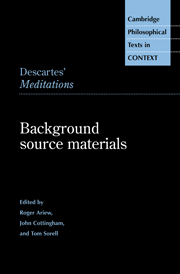Book contents
- Frontmatter
- Contents
- Preface
- Abbreviations
- General Introduction
- 1 Dialectic
- 2 That Nothing Is Known
- 3 The Promotion of Mathematics
- 4 Metaphysical Disputations
- 5 Wisdom
- 6 A Compendium of Philosophy in Four Parts
- 7 Corpus of Philosophy
- 8 The Use of Reason, The Impiety of the Deists, and The Truth of the Sciences
- 9 Unorthodox Essays against the Aristotelians
- 10 The Two Truths and The Immortality of the Soul
- 11 Dialogue on the Diversity of Religions and Little Skeptical Treatise
- 12 Universal Science
- 13 That God Exists
- Appendix: Condemnations of Cartesianism
- Bibliography
- Index
4 - Metaphysical Disputations
Published online by Cambridge University Press: 05 June 2012
- Frontmatter
- Contents
- Preface
- Abbreviations
- General Introduction
- 1 Dialectic
- 2 That Nothing Is Known
- 3 The Promotion of Mathematics
- 4 Metaphysical Disputations
- 5 Wisdom
- 6 A Compendium of Philosophy in Four Parts
- 7 Corpus of Philosophy
- 8 The Use of Reason, The Impiety of the Deists, and The Truth of the Sciences
- 9 Unorthodox Essays against the Aristotelians
- 10 The Two Truths and The Immortality of the Soul
- 11 Dialogue on the Diversity of Religions and Little Skeptical Treatise
- 12 Universal Science
- 13 That God Exists
- Appendix: Condemnations of Cartesianism
- Bibliography
- Index
Summary
Introduction
Born in Granada, Suárez was a member of the Jesuit order, and taught at Salamanca and Coimbra. His lengthy Metaphysical Disputations (the work is divided into fifty-four major sections, “disputation 1,” “disputation 2,” etc.) was a comprehensive treatise on metaphysics and one of the first to be developed in its own right, rather than as a commentary on Aristotle. Descartes, who was educated by the Jesuits, certainly studied Suarez's work, and a considerable amount of the framework for the Meditations (particularly the reasoning in the Third Meditation) bears the clear imprint of Suárez's ideas. We also know that Descartes had access to a copy of the Disputationes metaphysicae about the time he wrote the Meditations: he makes an explicit reference to disputation 9, section 2, 4 (the relevant extract is included here) as a source for his use of the term “material falsity.”
A facsimile reprint of the complete Latin text of the Disputationes was published in two volumes in 1965. The complete works of Suárez in the original Latin are available in the standard edition in twenty-six volumes (1861). There is a translation by F. Freddoso of a portion of the Disputationes, entitled On Efficient Causality: Metaphysical Disputations 17–19.
The Disputationes is of great interest to the student of Descartes both because it gives a vivid and detailed picture of the style and method of philosophical argument that Descartes would have imbibed as a schoolboy, and because it deploys a framework of theological and metaphysical assumptions that continued, sometimes almost subliminally, to influence Descartes, despite his official program for casting aside all preconceived opinions.
- Type
- Chapter
- Information
- Descartes' MeditationsBackground Source Materials, pp. 29 - 50Publisher: Cambridge University PressPrint publication year: 1998
- 1
- Cited by



